Career
Copyright@ Australian Catholic University 1998-2026 | ABN 15 050 192 660 CRICOS registered provider: 00004G | PRV12008
Copyright@ Australian Catholic University 1998-2026 | ABN 15 050 192 660 CRICOS registered provider: 00004G | PRV12008
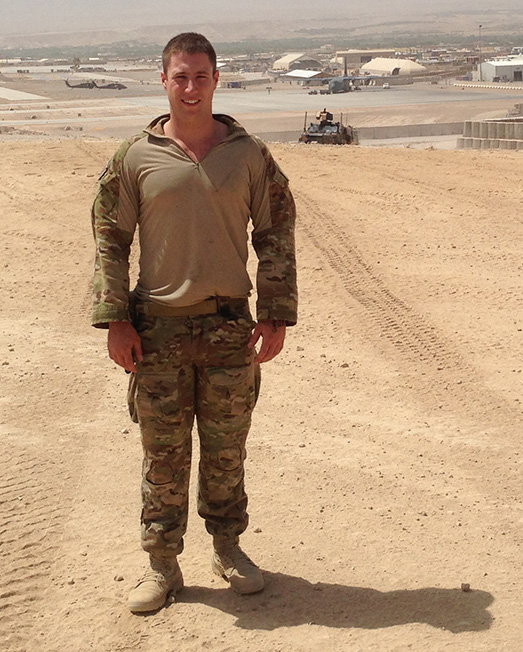
It’s 2014 and Joel Sardi is a healthy and successful 22-year-old rifleman with the Australian Army. He has plenty of friends, lives a fun and active life with his long-term girlfriend, Elisa, and plans to head overseas to quench his thirst for adventure.
“Back then, I thought I was invincible,” says Joel, who served with the 7th Battalion of the Royal Australian Regiment. “I had come back from my deployment in Afghanistan, I’d bought an investment property, and it just felt like my life was really taking off.”
Not long after he returned from his eight-month tour of duty, Joel fell three metres down a flight of stairs, landing on his back. For two days in hospital, he was barely conscious. When he came to, he was told that the fall had caused major spinal cord damage, paralysing his body from the shoulders down.
“Suddenly, I couldn’t even scratch my face,” he says. “I had to have a CamelBak straw stuck to my hand at night so I could drink, because I couldn’t do it myself. I needed that sort of help.”
When Joel was airlifted from Adelaide to Melbourne, it marked the beginning of a long journey of reckoning with his injury. The initial confusion was later mixed with feelings of denial and resistance.
“I remember being in hospital, and when the time came for my visitors to leave, I’d be there bawling my eyes out,” he says. “I’d say to Dad, ‘I can’t do this. It’s not fair.’ And he’d say, ‘No, we’ll get through it. We’ll get through this together.’”
After a year in intensive rehabilitation, Joel returned home. He recalls this moment as bittersweet.
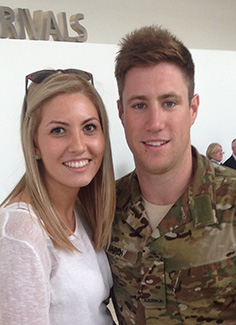
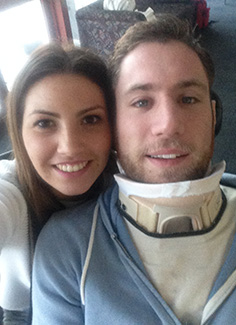
Elisa and Joel before and after his injury.
“It was nice to be out of the hospital, but at the same time, it felt like everybody else’s life was moving on. The visitors stopped coming, the nurses weren’t there, and every night I’d go to bed reminding myself that I’m a quadriplegic. That’s when the dark days really began.”
The next two years featured many ups and downs and a long period of adjustment for Joel Sardi and his family. But in time, the darkness started to fade.
Countless hours in the gym brought considerable physical progress, and Joel was able to take a trip overseas with Elisa, using a travel-friendly wheelchair to get around. This physical reawakening boosted his emotional strength and self-assurance.
“In the early days after my injury, I was really harsh on myself,” he says. “I didn’t even feel adequate to hang out with my mates or take part in everyday things. But travelling overseas really changed my perception of what I could achieve, and also what I could provide in my relationships and life in general. It was a natural healing process, and I started to find some acceptance of my injury.”
Before long, Joel was recounting his story as a motivational speaker. At his first presentation, titled ‘Life threw me a curveball, not a bullet’, he shed tears in front of a crowd of soldiers who were visibly moved by his openness and courage.
“That’s when I realised the power of sharing my story and my vulnerability, and what that can provide to other people,” he says.
Every day, Joel is confronted with the reality of his injury, and the way it has changed his life. But he has also realised that he has much to give.
“People have told me that hearing my story shifted their views about how they approach life, and how they handle challenges that arise,” says the 31-year-old, who has presented talks to defence personnel, professional sportspeople and university students, among others.
“What started out as just me telling a group of people about my journey and my injury has become a workshop of sorts, and a business that is helping to support my family. But also, to put it in a niche way, I like to use my story and my experiences to be an advocate for quadriplegics.”
With his confidence growing, Joel Sardi decided to chase his dream of working as a professional in the disability sector, enrolling in a Bachelor of Psychological Science at ACU through Student Veterans Services.
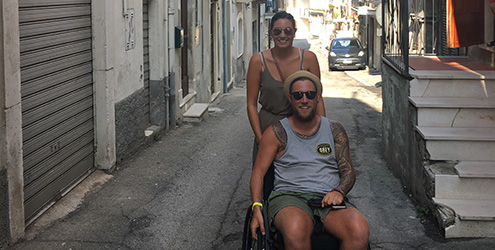
Joel and Elisa on travelling overseas.
University study proved to be enjoyable and fulfilling for Joel, as he combined the course with his regular job at a recruitment agency that works with the veteran community.
Then, in mid-2021, Joel was thrown another curveball when he was refused service at a Melbourne restaurant because he was in a wheelchair. Deeply hurt, he posted about the incident on social media.
“A pretty low night for me,” Joel said in the video. “I have never been more offended or upset based on the fact that I was discriminated against because of my disability.”
The post went viral, eventually prompting an apology from the restaurant. It also captured the attention of Australian athlete and philanthropist Dylan Alcott, who immediately realised that Joel Sardi, with his background in recruitment and his lived experience of disability, would be a perfect candidate to work on a new project with Get Skilled Access (GSA), the organisation Alcott founded in 2017.
Joel has since deferred university study and is employed by GSA as a program content developer. He spends his days working on an innovative digital platform that will help people with a disability to get jobs.
“This platform will change the world of employment for people with disability,” says Joel, who started working on the project in October 2021.
“We’re living in an age when you can work remotely doing almost anything, and yet people with a disability still have trouble getting jobs. I’m fortunate to be part of the movement to change this. We want to take this platform global, and make the world a better place for those living with disability.”
It’s April 2022 and Joel Sardi is in his van driving home from work. He is, once again, healthy and successful, and lives a fun and active life with his wife Elisa, who is pregnant with their second child.
Joel says his disability still presents many challenges, but it also presents opportunities. After all of the shock and heartache that followed his accident, and the inevitable pondering of ‘why me?’, he is at peace with his injury.
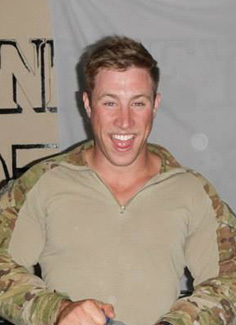
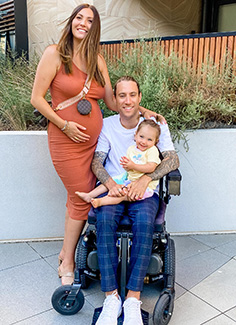
Joel in the army and with Elisa and Esmé.
“When the bad stuff happens, I think to myself, ‘Okay, this is bad, but look at all the good things that can come from it’,” he says. “I never thought I’d say it, but my injury has really brought out some beautiful things in my life.”
He describes the experience of driving – a task made possible thanks to adaptive technology that allows him to control the vehicle with his hands – as “like learning to walk again”.
“It helped me to realise many things I had lost in regards to independence and freedom,” he says. “It was a rediscovery of elements of life that I’d forgotten, elements of life that I once took for granted.”
Joel now sees himself as a voice and advocate for disability inclusion, but also as an educator to able-bodied people, a reminder that they can overcome their personal challenges.
“In the blink of an eye, I fell down some stairs and everything changed, and for a long time I thought my life was over,” Joel says.
“It’s taken a change of perspective to realise that this is not a bullet, it’s just a curveball. Everybody in life experiences challenges, and when that happens, we just need to adapt and learn to do things differently. My curveball was quadriplegia, but wheelchair or not, my life is awesome.”
Find more info on Joel Sardi and his public speaking.
Are you a current or former member of the Australian Defence Force who is keen to pursue university study? Explore your options at ACU.
Copyright@ Australian Catholic University 1998-2026 | ABN 15 050 192 660 CRICOS registered provider: 00004G | PRV12008